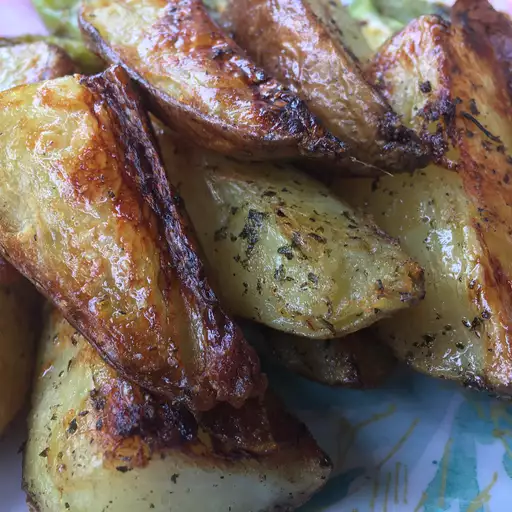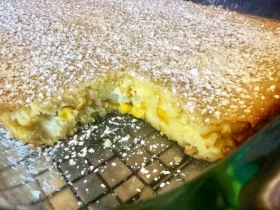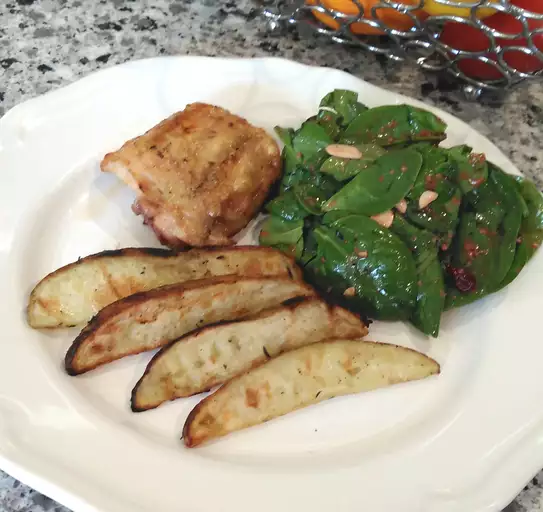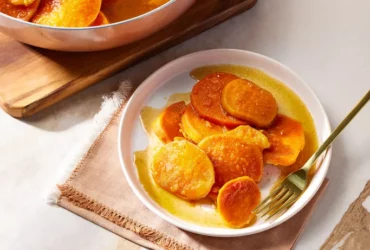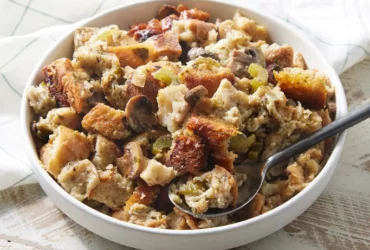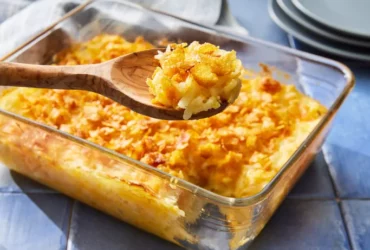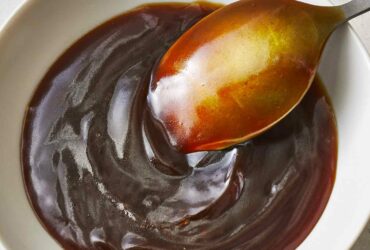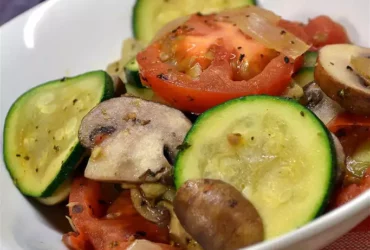Ingredients
Potatoes: Choose high-starch potatoes like Russet or Idaho for crispy wedges.
Potatoes are a starchy vegetable that play a vital role in the recipe, providing a crispy exterior and a fluffy interior when cooked correctly. When it comes to choosing potatoes for grilled potato wedges, it’s essential to select high-starch varieties.
High-starch potatoes, such as Russet or Idaho, have a higher solid content and a lower moisture level compared to waxy potatoes. This characteristic makes them ideal for grilling, as they will yield a crispy outside layer and a fluffy inside when cooked correctly.
Russet potatoes, in particular, are known for their high starch content, which allows them to brown well when grilled. Their rough, thick skin also provides an excellent texture contrast to the soft interior of the potato wedge.
Idaho potatoes, on the other hand, have a slightly sweeter flavor and a firmer texture than Russet potatoes. They still retain a high starch content, making them suitable for grilling but may produce a slightly more delicate flavor profile compared to Russet potatoes.
It’s worth noting that waxy potatoes, such as Yukon Gold or Red Bliss, are not the best choice for grilled potato wedges. Waxy potatoes have a lower starch content and retain their shape better when cooked, which can result in a less appealing texture and flavor when trying to achieve crispy exterior.
In summary, for the best results when making grilled potato wedges, choose high-starch potatoes like Russet or Idaho. These varieties will provide an excellent balance of texture and flavor, resulting in a delicious and satisfying snack that’s perfect for any occasion.
Olive Oil: Use a neutral oil with a high smoke point, such as avocado oil or grapeseed oil.
- When it comes to cooking with olive oil, choosing the right variety can make a big difference in achieving the perfect grilled potato wedges.
- The recipe calls for using a neutral oil that has a high smoke point, meaning it can withstand high temperatures without breaking down or smoking.
- Two good options are avocado oil and grapeseed oil, which have high smoke points of around 520°F (271°C) and 420°F (220°C), respectively.
- These oils have a light, neutral flavor that won’t compete with the natural flavors of the potatoes or add any unwanted tastes to your dish.
- Another benefit of using a high-smoke-point oil is that it reduces the risk of polycyclic aromatic hydrocarbons (PAHs) forming in the cooking oil, which can be detrimental to your health.
- So go ahead and choose either avocado oil or grapeseed oil for a healthier and tastier grilled potato wedges recipe!
Instructions
Preheat the Grill: Preheat your grill to medium-high heat (around 400°F/200°C).
To ensure that your grilled potato wedges turn out perfectly crispy on the outside and fluffy on the inside, it’s essential to preheat your grill correctly.
Here are the steps to follow
Locate a medium-high heat zone on your grill. This is usually indicated by a higher temperature reading on the thermostat or by observing the flame pattern.
Set your grill’s temperature to around 400°F (200°C). You can use a thermometer to ensure accuracy, as different grills may have varying temperature ranges.
Allow your grill to heat up for at least 10-15 minutes before adding the potato wedges. This will allow the grill plates or grates to reach their optimal temperature and prevent sticking.
Once you’ve preheated your grill, it’s time to move on to preparing your potato wedges. Make sure to follow any additional instructions provided in our recipe for the best results.
Cut and Prepare Potatoes: Cut potatoes into wedges and soak in cold water for at least 30 minutes.
Cut potatoes into wedges using a sharp knife, making sure to cut them evenly so that they cook consistently.
Place the potato wedges in a large bowl and cover them with cold water. This step is crucial in removing excess starch from the potatoes, which will help them become crispy when grilled.
Let the potato wedges soak in the cold water for at least 30 minutes. You can even let them soak for longer if you have more time. The longer they soak, the crisper they will be.
After the soaking period, drain the potato wedges and pat them dry with paper towels to remove excess moisture. This step is important in helping the potatoes cook evenly and preventing them from becoming too greasy when grilled.
You can also sprinkle the potato wedges with your favorite seasonings or herbs at this stage to give them extra flavor.
Tips and Variations
Seasoning Options: Experiment with different seasoning combinations, such as garlic powder, paprika, or chili powder.
The art of seasoning lies in experimentation and creativity when it comes to grilling potato wedges. One of the most basic yet effective seasoning options is a combination of garlic powder, paprika, and chili powder.
Start by sprinkling garlic powder, which adds an aromatic flavor that complements the natural sweetness of potatoes. The amount can be adjusted to personal taste, but a general guideline is 1-2 teaspoons per serving.
Paprika is another essential seasoning in this combination, adding a smoky depth and visual appeal to the wedges. Choose from mild or sweet smoked paprika for added complexity or go for the more intense hot paprika for an extra kick.
The final component of our seasoning blend is chili powder, which infuses a subtle yet noticeable heat and flavor. Use 1/2 to 1 teaspoon per serving to avoid overpowering the dish.
Othertime variations include adding cumin, coriander or onion powder to create a Mexican-inspired twist or incorporating Italian seasoning for a Mediterranean flair. Don’t be afraid to combine seemingly disparate flavors to discover your unique signature seasoning blend.
Additionally, experiment with different herbs such as parsley, chives or rosemary, adding them either as a garnish after the wedges are grilled or by mixing them into the seasoning mixture before application. Freshness is key when it comes to herbs, so use them immediately for optimal flavor impact.
As a general rule of thumb, it’s best to apply the seasonings in small amounts and build up gradually, allowing your palate to adjust to each new layer of flavor. This method also helps prevent overpowering individual flavors with too much seasoning.
Get Creative with Toppings: Add grated cheese, chopped herbs, or diced jalapeños for extra flavor and texture.
The world of grilled potato wedges is a versatile one, and it’s easy to get creative with toppings to suit your taste buds.
Tips for Customizing Your Grilled Potato Wedges
Spicy Kick
Add some diced jalapeños or sliced hot peppers on top of the cheese for an extra spicy kick. You can also sprinkle some red pepper flakes over the potatoes for added heat.
Herby Flair
Chopped fresh herbs like parsley, rosemary, thyme, or chives add a bright and refreshing flavor to your grilled potato wedges. Simply sprinkle them on top of the cheese before serving.
Cheesy Delight
Grated Parmesan, cheddar, or mozzarella cheese melts beautifully over the potatoes, adding richness and creaminess. You can also mix and match different types of cheese for a unique flavor combination.
Savory Options
Consider adding some crumbled bacon, diced onions, or minced garlic on top of your grilled potato wedges for added savory flavor.
Variations to Try
- Creamy and Cheesy: Top your grilled potato wedges with a dollop of sour cream or Greek yogurt, followed by some grated cheese, diced herbs, and a sprinkle of paprika.
- Italian-Style: Sprinkle some dried oregano and basil over the potatoes, then top with a drizzle of olive oil, salt, and pepper.
- Mexican-Inspired: Mix some chopped cilantro and lime juice over the potatoes, then sprinkle with crumbled queso fresco or feta cheese.
- Best Lusha Alternatives for 2025 - April 22, 2025
- Best Overloop Alternatives for 2025 - April 22, 2025
- Best 6sense Alternatives for 2025 - April 22, 2025

